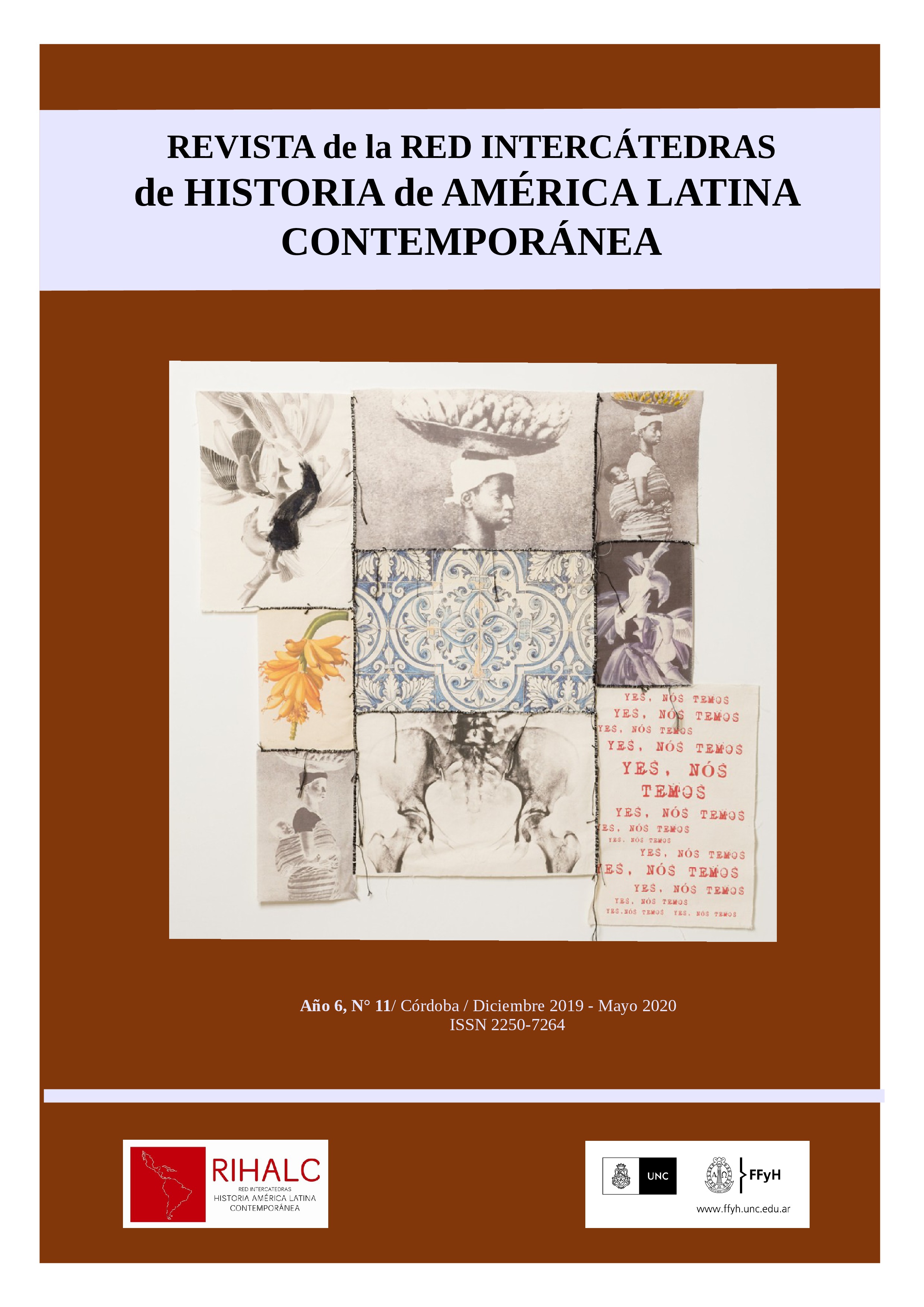Las mujeres del Tercer Mundo en Estados Unidos y el acceso al aborto. Un aporte a la discusión sobre la legalización del aborto en Argentina
Keywords:
Aborto, Mujeres del Tercer Mundo, FeminismosAbstract
From a historical analysis based on the study of a particular case: the legalization of abortion in 1973 in the United States and how this had an impact on one of the most important feminist organizations of the time, the Third World Women's Alliance (TWWA), an organization that saw itself as belonging to Third World women, this paper seeks to contribute to the discussions that have taken place in Argentina in recent times about the decriminalization and legalization of voluntary termination of pregnancy. For the development of this work, some articles of the TWWA periodical publication, called Triple Jeopardy: Racism, Imperialism, Sexism, are analyzed in order to give an account of the position that the organization acquired regarding the problem of abortion. Then, some reflections on this problem and the debates that are currently taking place in Argentina will be addressed, as well as the characteristics adopted by the local feminist movement.
Key words: Abortion; Third World Women; Feminisms.
References
Anzaldúa, Gloria (1987): Borderlands: The New Mestiza. La Frontera, Aunt Lute Books, San Francisco.
Arriaga, María Isabel (2003): “Construcciones discursivas en los márgenes: resistencia chicana en Borderlands/La Frontera: The New Mestiza de Gloria Anzaldúa”, Anuario Facultad de Ciencias Humanas, N° 2, Vol. 10, Año X, Universidad Nacional de La Pampa, pp. 1-15.
Beal, Frances (1970): “Double Jeopardy: To Be Black and Female”, en Bambara, Toni Cade (Comp.), The Black Woman. An Anthology, Washington Square Press, Nueva York, pp. 109-122.
Breines, Winifred (2006): The Trouble Between Us. An Uneasy History of White and Black Women in the Feminist Movement, Oxford University Press, USA.
Brown, Heather (2012): Marx on gender and the family. A critical study, Brill, Boston.
Carastathis, Anna (2014): “The Concept of Intersectionality in Feminist Theory”, Philosophy Compass, N° 5, Vol. 9, pp. 304-314.
Cejas, Mónica (2001): “Desde la Experiencia. Entrevista a Ochy Curiel”, Revista Andamios, [En línea] N° 17, Vol. 8, Septiembre-diciembre, pp. 181-197. Consultado (25/5/2019). Disponible en línea en: https://es.scribd.com/document/249503403/Ochy-Curiel-pdf
Davis, Angela (1998): Blues Legacies and Black Feminism, Vintage, Nueva York.
Davis, Angela (2004-2005): Mujeres, Raza y Clase, Ediciones Akal, Madrid.
Degler, Carl (1986): Historia de Estados Unidos. La formación de una potencia 1600-1860, Ariel, España.
Evans, Sara (2004): Tidal Wave. How women changed America at century’s end, Free Press, EEUU.
Federici, Silvia (2011): Calibán y La Bruja. Mujeres, cuerpo y acumulación originaria, Tinta Limón Ediciones, Buenos Aires.
Ferguson, Susan y McNally, David (2013): “Capital, Labour-Power, and Gender- Relations: Introduction to the Historical Materialism Edition of Marxism and the Oppression of Women”, en Vogel, Lise (Ed.), Marxism and the Oppression of Women, Brill, Londres.
Guerra Schleef, Felipe (2016): “Reseña: A Descolonizar las metodologías. Investigación y pueblos indígenas de Linda Tuhiwai Smith”, Revista Austral de Ciencias Sociales, [En línea] N° 31, pp. 183-187. Consultado (25/5/2019). Disponible en línea en: https://www.redalyc.org/pdf/459/45955902012.pdf
Henry, Astrid (2004): Not mymother’s sister. Generational Conflict and Third-Wave Feminism, Indiana University Press, EEUU.
Hewitt, Nancy (2010): No Permanent Waves. Recasting Histories of U.S. Feminist, Rutgers University Press, EEUU.
Hill Collins, Patricia (2000): Black Feminist Thought: Knowledge, Consciousness and the Politics of Empowerment, Second Edition, Routledge, London.
Hill Collins, Patricia (2012): “Rasgos Distintivos del pensamiento feminista negro”, en Jabardo, Mercedes (Ed), Feminismos Negros. Una Antología, Traficantes de Sueños, Madrid, pp. 99-134.
hooks, bell (2004): “Mujeres negras. Dar forma a la teoría feminista”, en A.A.V.V., Otras Inapropiables. Feminismos desde las fronteras, Traficantes de Sueños, Madrid, pp. 33-50.
Jabardo, Mercedes. (Ed) (2012): Feminismos Negros. Una Antología, Ed. Traficantes de Sueños, Madrid.
Laughlin, Kathleen (2010): “Is It Time to Jump Ship? Historians Rethink the Waves Metaphor: Introduction”, Feminist Formations, N° 1, Vol. 22, pp. 76-135.
Lugones, María (2008): “Colonialidad y Género”, Tabula Rasa, [En línea], N° 9, Julio-diciembre, pp. 73-101. Consultado (25/5/2019). Disponible en línea en: http://www.redalyc.org/pdf/396/39600906.pdf
Mohanty, Chandra (2008): “Bajo los ojos de occidente. Academia Feminista y discurso colonial”, en Suárez Navaz, Liliana y Hernández, Rosalva Aída (Eds.), Descolonizando el Feminismo: Teorías y Prácticas desde los Márgenes, Cátedra, Madrid, pp. 112-162.
Peniel, Joseph. (Ed.) (2006): The Black Power Movement. Rethinking the Civil Right-Black Power Era, Taylor and Francis Group, EEUU.
Puleo, Alicia (2007): “Lo personal es político: el surgimiento del Feminismo Radical”, en Amorós, Cecilia y De Miguel, Ana, Teoría Feminista: de la Ilustración a la Globalización. Del Feminismo Liberal a la Posmodernidad, Minerva Ediciones, Madrid, pp. 35-67.
Quijano, Aníbal: “Colonialidad del poder, eurocentrismo y América Latina”, en Lander, Eduardo (Comp.), La colonialidad del saber: eurocentrismo y ciencias sociales. Perspectivas latinoamericanas, Fundación CICCUS, Ciudad Autónoma de Buenos Aires, pp. 219-264.
Rojas Blanco, Lillyam y Rojas Porras, Marta Eugenia (2015): Guía de uso del lenguaje inclusivo de género en el marco del habla culta costarricense, Universidad Nacional de Costa Rica, Instituto de Estudios de la Mujer, Costa Rica.
Smith, Linda Tuhiwai (2016): A descolonizar las metodologías: investigación y pueblos indígenas, Lom Ediciones, Santiago de Chile.
Springer, Kimberly (2006): Living for the Revolution. Black Feminist Organizations, 1968-1980, Duke University Press, EEUU.
Sudbury, Julia (1998): Other Kinds of Dreams. Black women´s organizations and the politics of transformation, Routledge, London.
Viveros Vigoya, Mara (2009): “La sexualización de la raza y la racialización de la sexualidad en el contexto latinoamericano actual”, Revista Latinoamericana de Estudios de Familia, [En línea], Vol 1, pp. 63-81. Consultado (25/5/2019). Disponible en línea en: http://revlatinofamilia.ucaldas.edu.co/downloads/Rlef1_4.pdf
Ward, Stephen (2006): “Chapter 5: “The Third World Women´s Alliance. Black Feminist Radicalism and Black Power Politics”, en Peniel, Joseph (Ed.), The Black Power Movement. Rethinking the Civil Rights – Black Power Era, Taylor and Francis Group, Estados Unidos, pp. 119-144.
Downloads
Published
Issue
Section
License
Aquellos autores/as que tengan publicaciones con esta revista, aceptan los términos siguientes:
- Los autores/as conservarán sus derechos de autor y garantizarán a la revista el derecho de primera publicación de su obra, el cuál estará simultáneamente sujeto a la Licencia de reconocimiento de Creative Commons que permite la libre distribución con mención de su(s) creadores, no permite el uso comercial ni las obras derivadas. Los autores, al enviar el artículo, acuerdan publicarlo bajo esta licencia..
- Los autores/as podrán adoptar otros acuerdos de licencia no exclusiva de distribución de la versión de la obra publicada (p. ej.: depositarla en un archivo telemático institucional o publicarla en un volumen monográfico) siempre que se indique la publicación inicial en esta revista.
- Se permite y recomienda a los autores/as difundir su obra a través de Internet (p. ej.: en archivos telemáticos institucionales o en su página web) después del proceso de publicación.



